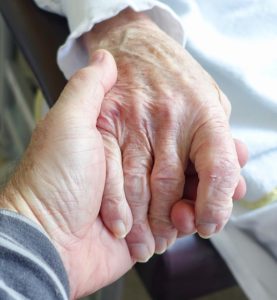
When someone says the word ‘dementia’ to you, the first thing you’ll think of will probably be memory.
While difficulties with memory, either short or long-term, is a significant symptom of various types of dementia, there are other warning signs which you should be mindful of.
Dementia and changes in the senses
Many people affected by dementia and Alzheimer’s experience changes to their senses. Problems with vision and spatial awareness are just one example, as is having difficulties with identifying colours or objects in the background.
The sense of taste can also be an indicator of dementia, particularly if a person is finding it hard to tell the temperature of their food. They might even develop a sudden dislike for certain foods that they may have enjoyed previously, or have a new favourite food that might be unusual to the preferences they’ve had their entire lives.
People with Alzheimer’s have also been known to have difficulties with their sense of smell, especially identifying or recognising specific odours. This is because the brain needs to process the smell detected by our noses, however with Alzheimer’s these regions of the brain are often amongst the first to be affected.
Though some sensory changes can be linked to other health conditions, spotting these in a loved one can lead to an earlier diagnosis and help you to find the right treatment and support for you both.
Keeping emotions in check
Sudden changes to a person’s emotional state can be strong indicators of dementia as well as other mental health conditions. These changes range from a person becoming withdrawn or isolating, as well as irritability and even aggression, and are often caused by the brain’s ability to process a situation clearly and logically.

Alongside these changes, people with dementia can lose confidence or have trouble with self-esteem, especially if they feel as though they have nobody to understand what they are experiencing.
Often a person will have little control over these emotional changes and may find them difficult to understand or process. This turn, might heighten the sense of feeling overwhelmed which has an even greater emotional impact on their emotional wellbeing.
If you suspect a loved one’s emotions are becoming unpredictable or if they’re isolating themselves, try talking to them about what they are experiencing and reassure them that you are there for them. It might also be an idea to speak to a GP to see if these symptoms are linked to conditions such as depression or anxiety.
Dementia often affects a person’s ability to communicate, both verbally and through body language or gestures. Being able to understand complex ideas or sentences in particular can be significantly affected.
Conversations can be difficult for a person affected by dementia as their ability to use specific words or language declines. For instance, you might notice that a loved one might forget the name of specific objects such as a chair or book and use another phrase instead. They might also have difficulties understanding tone or what you meant, and so will find it hard to respond appropriately.
When communicating with a loved one who had dementia, give them plenty of time to register, process, and understand what you are telling them, steering away long or complicated words to make this easier for them.
The Alzheimer’s Society also advises using a light, conversational tone help your loved one to feel calm and relaxed, as well as having a quiet environment to hold the discussion i.e. turning off the radio or television.
Over time, your loved one may completely lose the ability to communicate verbally entirely and this can lead to them feeling frustrated. Again, it’s important to remain as calm as possible and give them as much time as they need to show you what they’re trying to say in their own way.
A personal story of dementia – Jayne’s story

Understanding the less obvious symptoms of dementia is something that our dementia specialist Jayne Vale has first-hand experience of. Before joining us here at Helping Hands, Jayne took care of her grandfather who was never formally diagnosed with Alzheimer’s but displayed many of the symptoms, and her grandmother also lived with vascular dementia.
Jayne also took care of an elderly gentleman with Lewy body dementia, and over time his ability to communicate was dramatically reduced as was his mobility. Seeing how dementia affected both this gentleman and her grandfather has made Jayne feel passionately about educating other families and carers about all aspects of the condition.
Hear Jayne talk about her experiences.
Supporting a loved one with dementia
Taking care of a loved one affected by dementia can be a considerable undertaking. However by recognising and understanding specific symptoms allows you to find the right support as a family.
And if you’re finding that you need a little extra help, then we’re only ever a phone call away.
To read about the different types of dementia, please click here.
